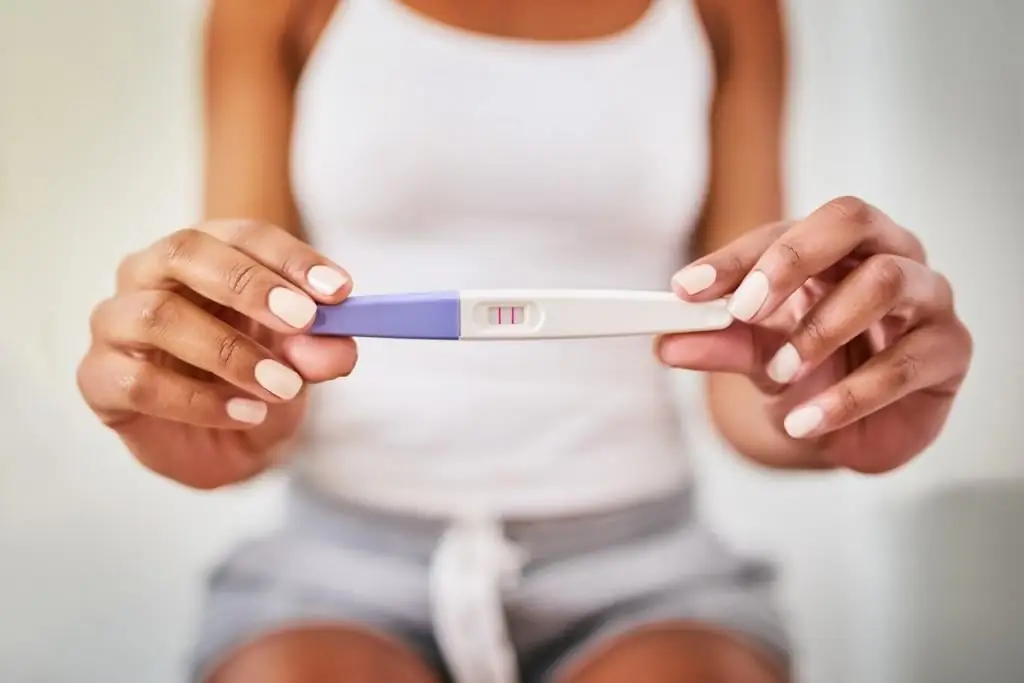2026 Author: Priscilla Miln | miln@babymagazinclub.com. Last modified: 2025-01-22 17:55:13
The thyroid gland plays an important role in the he althy functioning of the entire human body. The endocrine system is in close connection with others. Therefore, disruption of the work of one entails consequences in all systems interconnected with it.
What you need to know?
With insufficient secretion of thyroid hormones, organs such as the heart suffer. Patients often complain of heart palpitations, shortness of breath, fatigue.

Hormon deficiency has a particularly negative effect on the human nervous system. This is manifested in behavioral changes, inconstancy of mood, the inability of a person to control his own emotions.
The hormonal background is disturbed, since thyroid hormones are directly related to the hormones of the genital organs. In the female, this manifests itself in violation of the menstrual cycle. In the complete absence of menstruation, the possibility of conception is excluded.
Distinguish between hyperfunction and hypofunction of the thyroid gland. Any deviation fromnorm is a pathology. Hyperfunction, or increased production of hormones, affects the increase in blood and intraocular pressure. A striking symptom is bulging of the eyeballs. During pregnancy, an excess of thyroid hormones can lead to the threat of premature birth, spontaneous abortion.

Hypofunction, on the contrary, is characterized by a decrease in hormone levels. This disease is called hypothyroidism. This condition in rare cases is the cause of infertility, and during pregnancy can cause fetal malformations and intrauterine death. Therefore, treatment must begin as soon as the problem was discovered. Since there is a lack of thyroid hormones, it is appropriate to prescribe replacement therapy. "L-Thyroxine" and "Iodomarin" are widely used during pregnancy.
When appointed?
This drug is indicated in the treatment of diffuse euthyroid goiter. It is used as a prophylaxis for recurrence of nodular goiter. Also with malignant neoplasms, such endocrinological diseases as myxedema, cretinism. "L-Thyroxin" is vital for partial or complete removal of the thyroid gland.

When "L-Thyroxine" is prescribed during pregnancy:
- If a woman was ill before becoming pregnant, and was undergoing treatment, then the drug continues to be prescribed.
- During pregnancy, various disturbances in the functioning of the thyroid gland are possible. The reason for this is the adaptation of the woman's body to new conditions. The restructuring of all systems for the formation of an embryo can lead to disruption of the normal life of a pregnant woman. Then it is advisable to start taking "L-thyroxine". The drug does not harm the embryo. It has no toxic, mutagenic effect. Through the placental barrier does not penetrate. All this contributes to the calm use of the medicine.
Features of taking "L-Thyroxine"
According to reviews, "L-Thyroxine" helps well during pregnancy. The drug is a synthetic hormone. The active substance is levothyroxine. In the body, it performs the work that the missing hormone should normally do. It regulates metabolism, affects the development of cells, helps in the functioning of the cardiovascular system, and also stimulates the central nervous system.

In the first trimester of pregnancy, "L-Thyroxin" takes part in the development of the embryo. In the following months, it helps the already formed thyroid gland of the fetus.
It is necessary to take "L-Thyroxine" only as directed by an endocrinologist. You cannot set or change the dose yourself.
Recommendations
There are some features of taking the medicine. When using "L-Thyroxine" during pregnancy, the instruction is as follows:
- Must take the tablet half an hour before meals.
- Take plenty of water, other drinks are not advisable.
- For breakfastit is forbidden to drink coffee, milk, meat intake should be postponed until the second half of the day.
- It is more convenient to buy tablets with the full and required dosage. This will minimize the risk of taking the wrong dose.
- If the morning intake is missed, it is recommended to drink the medicine no later than 3-4 hours after eating.
- It is acceptable to divide the drug into several times a day, if there is a poor tolerability of the drug.
Dosage aspects
"L-Thyroxine 50" during pregnancy does not go well with many other drugs, so you must immediately inform the doctor of the list of medications taken. It can change the effect of antidepressants, sugar-lowering drugs, anticoagulants. It is advisable not to use any iodine-containing supplements, vitamins, mineral complexes at the same time. Calcium preparations can be consumed a few hours after taking "L-Thyroxine".
If the dose of "L-Thyroxine" during pregnancy is only selected, then it is important to control the level of hormones in the blood. The frequency of testing is once every two months. At the prescribed dose - once every six months.
Due to the fact that during pregnancy, even in a he althy mother, there is a large consumption of hormones for the development of the fetus, then with a critical decrease in the level of the hormone, a full dose of "L-Thyroxine" is prescribed immediately. This is very important because the he althy development of the baby is at stake.
The effect of thyroid hormones on the body of a pregnant woman
The thyroid gland is responsible for the production of hormones such as thyroxine(T4), triiodothyronine (T3), calcitonin.
When a woman is pregnant, many systems are restructured in her body. This is due to the fact that the mother's resources are needed for the development of the child. These hormones go to the formation of different systems of the fetus. As a result, the amount of free thyroxine in the mother's blood decreases.
Also during pregnancy, the amount of a special protein - globulin, which binds thyroxin, increases. This is due to an increase in estrogen.
During the first months, human chorionic gonadotropin is found in the blood of a woman. In connection with the increase in its concentration, the amount of thyroid-stimulating hormone (TSH) decreases. There is a risk of hyperthyroidism. But estrogen stimulates globulin, which protects against an excess of thyroxin.
Pregnancy affects kidney function. The filtration rate increases, and as a result, the removal of iodine from the body is accelerated. Therefore, all pregnant women are prescribed iodine preparations.
Why?
The use of "L-Thyroxine" during pregnancy is necessary if the physiological processes in the body are disturbed, and this leads to a deficiency of thyroxine. If the indicators are not corrected, the situation can lead to fetal abnormalities, even miscarriages. The formation of the nervous system is disrupted, which will further affect psychoneurological complications.

In the first trimester, even when the indicators are not critical, "L-Thyroxine" is still used. In the fifth week, the fetus develops its own thyroid gland. The function of iodine accumulation develops at the twelfth week, but only at the sixteenth the organ is considered to be formed. And then you can reduce the dose or cancel. Only with greatly increased rates, the use of "L-Thyroxine" continues.
After the birth of a child, the drug continues to be taken if the woman was diagnosed and she took "L-Thyroxine" before pregnancy.
During the bearing of the baby, the dose increases, it is forbidden to reduce it on your own. After giving birth, after about two and a half months, it is necessary to take tests for hormones. Depending on the result, the endocrinologist prescribes the dosage.
If thyroid disorders appeared during pregnancy, then after the birth of the baby, the doctor will cancel the drug. This is necessary in order to determine the causes of the pathology. If hormone levels return to normal, this will indicate temporary disturbances.
Contraindications for use
It must be remembered that "L-Thyroxine" is a hormonal drug. Take it carefully.

This medicine increases the amount of the hormone in the human blood, so the use of he althy or elevated levels is strictly prohibited. During pregnancy, inattention can lead to fatal consequences.
If there is an allergic reaction to levothyroxine or any excipient, the drug is prohibited. For example, if there was an allergy to lactose, this should be taken into account.
Presence of acute deficiencyadrenal glands, pituitary gland is also a contraindication to the use of the drug. Only after the treatment of these conditions can we talk about the appointment of "L-Thyroxine".
Medication is also prohibited if there are acute cardiovascular diseases: acute heart attack, acute myocarditis.
L-Thyroxine should be prescribed carefully for small children and the elderly.
But the main contraindication is only allergic intolerance to the drug. In other cases, in consultation with an experienced doctor, the appointment is permissible under the constant supervision of an endocrinologist.
Possible consequences
Hormonal overdose can lead to symptoms of hyperthyroidism. This is a violation of the nervous system - irritability, sleep disturbance, excitability.

Also:
- Heart suffers: there is a rhythm disturbance, tachycardia.
- Renal function worsens, there may be swelling.
- Possible hair loss, excessive dryness of the skin.
- Increased appetite, leading to weight gain.
- Weight gain is a common consequence of hormone treatment. Therefore, it is necessary to monitor your own weight. This is not an easy task, but within reason it is doable.
- Severe chronic diseases are possible, especially of a neurological nature.
Conclusion
In order to eliminate undesirable consequences as much as possible, the dosage of "L-Thyroxine" is adjusted. Or is it temporaryreception interruption. In case of severe overdose, appropriate treatment may be prescribed.
It is important to remember: the consequences of "L-Thyroxine" during pregnancy are not as terrible as ignoring hypothyroidism.
Recommended:
"Cycloferon" during pregnancy - is it possible or not? Instructions for use of the drug during pregnancy

The use of "Cycloferon" during pregnancy in the early stages helps to get rid of the symptoms of viral and infectious disorders. Human immunity is activated, a stable antimicrobial effect occurs. Tumor formation in the body slows down, autoimmune reactions are restrained, pain symptoms go away
"Sinupret" during pregnancy in the 3rd trimester. Instructions for use of the drug during pregnancy

Infection and inflammation are more pronounced when the body is weakened, so experts choose safe medicines. Used "Sinupret" during pregnancy. The 3rd trimester passes without serious complications if the infection can be overcome on time with the help of this medicine
"Fraxiparine" during pregnancy: reviews, instructions for use, contraindications

If the doctor has decided to use Fraxiparine injections during pregnancy, reviews from the Internet are not taken into account. The drug is indicated for use in serious pathologies, therefore, there is a threat to the life of the mother
"Venarus" during pregnancy: instructions for use, contraindications, reviews

Pregnancy is a complex physiological process. The body of a woman undergoes serious changes and loads in a short time. The gestation period in many is accompanied by varicose veins and hemorrhoids. Treatment is carried out with angioprotectors, one of these drugs is Venarus. It is semi-synthetic and less dangerous than many analogues
Fenuls drug during pregnancy: indications for use and detailed instructions with contraindications and methods of administration

Pregnancy is the most important period in a woman's life. However, at this time, the expectant mother may face certain troubles. For example, iron deficiency anemia. One of the most effective means for normalizing the condition of a pregnant woman is the drug Fenyuls. Read more about it in this article

